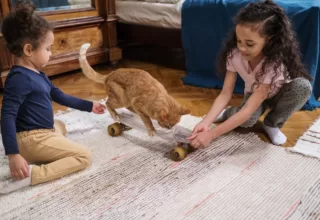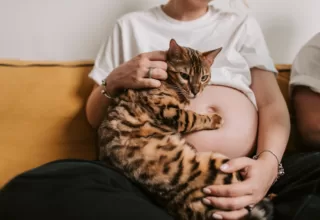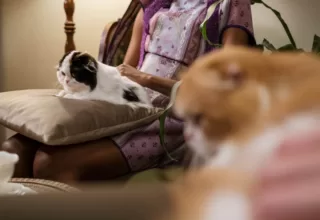Are Certain Cat Breeds Better with Babies?
Outline
- Introduction
- Definition of cat breeds
- Importance of compatibility between cats and babies
- Factors to consider when choosing a cat breed for babies
- Temperament and behaviour
- Allergies
- Size and activity level
- Safety considerations
- Cat breeds that are generally good with babies
- Maine Coon
- Ragdoll
- Birman
- Abyssinian
- British Shorthair
- Benefits of having a cat around babies
- Emotional development
- Companionship
- Reducing stress and anxiety
- Teaching responsibility
- Precautions and guidelines for introducing a cat to a baby
- Slow and supervised introductions
- Creating safe spaces for both cat and baby
- Teaching children how to interact with cats
- Conclusion
- FAQs
Introduction
Having a pet can be a wonderful experience for children, providing them with a furry friend to play with, love, and learn from. When it comes to choosing a cat breed to bring into a household with a baby, it’s important to consider certain factors to ensure a harmonious and safe environment for everyone involved. In this article, we will explore various cat breeds that are generally considered to be good with babies, the benefits of having a cat around infants, as well as precautions and guidelines for introducing a cat to a baby. Cats come in various breeds, each with its own unique characteristics and temperaments. While cats are known for their independent nature, many breeds can also be incredibly affectionate and tolerant, making them suitable companions for babies. Ensuring a good match between a cat and a baby is essential for fostering a positive and safe environment.
Factors to Consider When Choosing a Cat Breed for Babies
When selecting a cat breed to coexist with a baby, several factors should be taken into account.
Temperament and Behavior
The temperament of a cat plays a significant role in determining its compatibility with babies. Gentle, patient, and social cats are generally better suited for households with infants. Breeds known for their friendly and easygoing nature are often ideal choices.
Allergies
It’s crucial to consider the potential for allergies when introducing a cat to a baby. Some cat breeds are hypoallergenic or produce fewer allergenic proteins, reducing the risk of triggering allergic reactions in sensitive individuals.
Size and Activity Level
The size and activity level of a cat are important considerations when living with a baby. Small to medium-sized breeds are typically more manageable and less likely to accidentally harm a baby. Additionally, cats with lower energy levels may be better suited for households with infants.
Safety Considerations
Certain cat breeds have specific physical characteristics or personality traits that make them more suitable for households with babies. Cats with a calm demeanor, good balance, and a gentle nature are generally preferred to minimize accidental scratching or biting incidents.
Cat Breeds That Are Generally Good with Babies
While individual cat personalities may vary, some cat breeds have gained a reputation for being well-suited for families with infants. Here are a few examples:
Maine Coon
The Maine Coon is a large, gentle breed known for its friendly and sociable nature. They are patient, tolerant, and H1: Are Certain Cat Breeds Better with Babies?
Having a pet can be a wonderful experience for children, providing them with a furry friend to play with, love, and learn from. When it comes to choosing a cat breed to bring into a household with a baby, it’s important to consider certain factors to ensure a harmonious and safe environment for everyone involved. In this article, we will explore various cat breeds that are generally considered to be good with babies, the benefits of having a cat around infants, as well as precautions and guidelines for introducing a cat to a baby.
Factors to Consider When Choosing a Cat Breed for Babies
When selecting a cat breed to coexist with a baby, several factors should be taken into account.
Temperament and Behavior
The temperament of a cat plays a significant role in determining its compatibility with babies. Gentle, patient, and social cats are generally better suited for households with infants. Breeds known for their friendly and easygoing nature are often ideal choices.
Allergies
It’s crucial to consider the potential for allergies when introducing a cat to a baby. Some cat breeds are hypoallergenic or produce fewer allergenic proteins, reducing the risk of triggering allergic reactions in sensitive individuals.
Size and Activity Level
The size and activity level of a cat are important considerations when living with a baby. Small to medium-sized breeds are typically more manageable and less likely to accidentally harm a baby. Additionally, cats with lower energy levels may be better suited for households with infants.
Safety Considerations
Certain cat breeds have specific physical characteristics or personality traits that make them more suitable for households with babies. Cats with a calm demeanor, good balance, and a gentle nature are generally preferred to minimize accidental scratching or biting incidents.
Cat Breeds That Are Generally Good with Babies
While individual cat personalities may vary, some cat breeds have gained a reputation for being well-suited for families with infants. Here are a few examples:
Maine Coon
The Maine Coon is a large, gentle breed known for its friendly and sociable nature. They are patient, tolerant, and adaptable, making them excellent companions for children of all ages. Maine Coons are also known for their intelligence and are often comfortable in various social settings.
Ragdoll
Ragdolls are renowned for their docile and calm temperament. They are often referred to as “gentle giants” due to their large size and relaxed nature. Ragdolls enjoy human companionship and are typically tolerant of children, making them a popular choice for families.
Birman
Birmans are known for their affectionate and gentle nature. They form strong bonds with their human family members and are often tolerant of handling by children. Birmans are also relatively low-maintenance and adaptable, making them suitable for households with babies.
Abyssinian
Abyssinians are highly active and playful cats that thrive on social interaction. Despite their high energy levels, they are generally patient and gentle with children. Abyssinians are known for their curiosity and intelligence, which can provide entertainment and stimulation for both babies and older children.
British Shorthair
British Shorthairs have a calm and easygoing temperament, making them a good choice for families with babies. They are typically reserved and undemanding, enjoying peaceful moments with their human companions. British Shorthairs are also known for their adaptability and can adjust well to new environments
Benefits of Having a Cat Around Babies
Introducing a cat into a household with a baby can bring numerous benefits to both the child and the family as a whole.
Emotional Development
Having a cat around can contribute to a child’s emotional development. Interacting with a pet teaches empathy, compassion, and responsibility. Children learn to care for another living being, which can help foster kindness and nurturing qualities.
Companionship
Cats can provide valuable companionship for babies and children. They offer unconditional love and are often there to listen and provide comfort. The presence of a cat can help alleviate feelings of loneliness and provide a source of entertainment and affection.
Reducing Stress and Anxiety
Pets, including cats, have been shown to have a calming effect on individuals, reducing stress and anxiety levels. The soothing presence of a cat can create a sense of relaxation and promote a positive atmosphere within the home. This can be particularly beneficial for both parents and babies during stressful times or transitions.
Teaching Responsibility
Growing up with a cat can teach children important life skills, such as responsibility and accountability. Taking care of a pet involves feeding, grooming, and providing a safe environment. These tasks instill a sense of responsibility in children and teach them the importance of meeting the needs of another living being.
Precautions and Guidelines for Introducing a Cat to a Baby
While cats can be wonderful companions for babies, it’s important to take precautions and follow guidelines to ensure a safe and positive interaction between the two.
Slow and Supervised Introductions
When introducing a cat to a baby, it’s essential to do so gradually and under close supervision. Allow the cat to explore the baby’s scent and surroundings at their own pace. Always ensure that both the cat and the baby are comfortable and never force interaction.
Creating Safe Spaces for Both Cat and Baby
Provide separate safe spaces for both the cat and the baby. Cats should have areas where they can retreat to when they need privacy or time alone. Likewise, create a safe and designated area for the baby where the cat’s access is limited. This ensures that both the cat and the baby have their own space and can feel secure.
Teaching Children How to Interact with Cats
It’s important to educate children on how to interact with cats appropriately. Teach them to be gentle, avoid pulling the cat’s tail or ears, and respect the cat’s boundaries. Supervise all interactions between the child and the cat to prevent any accidental harm or stress to either party.
Conclusion
When considering whether certain cat breeds are better with babies, it’s important to focus on individual cat temperament, behavior, and compatibility with the family. While some cat breeds may have characteristics that make them generally well-suited for households with babies, it’s crucial to remember that each cat is unique. By considering factors such as temperament, allergies, size, and safety, families can make informed decisions when choosing a cat breed that will be a loving and compatible companion for their baby.
FAQs
Q. What cat breeds should I avoid if I have a baby?
Some cat breeds that may not be suitable for households with babies include highly energetic or aggressive breeds. It’s important to research and understand the specific needs and temperaments of different cat breeds before making a decision.
Q. How can I introduce my cat to my baby safely?
Slow and supervised introductions are key. Gradually allow the cat to familiarize themselves with the baby’s scent and surroundings. Always prioritize the safety and comfort of both the cat and the baby.
Q. Are there any health risks associated with cats and babies?
While rare, certain precautions should be taken to minimize potential health risks. Ensure that the cat is up to date on vaccinations and deworming. Regular veterinary check-ups for both the cat and the baby are important to monitor their health and ensure a safe environment.
Q. Should I adopt a kitten or an adult cat for my baby?
Both kittens and adult cats can be suitable companions for babies, but there are some considerations. Kittens require more attention and may have higher energy levels, while adult cats may be more settled in their behavior. Assess your family’s lifestyle and preferences to make the best choice.
Q. How can I teach my child to be gentle with our cat?
Teach your child to be gentle and respectful towards the cat from an early age. Demonstrate proper petting techniques and explain the importance of treating animals with kindness. Supervise interactions and provide gentle reminders when needed.
How useful was this post?
Click on a star to rate it!
Average rating 5 / 5. Vote count: 1
No votes so far! Be the first to rate this post.



